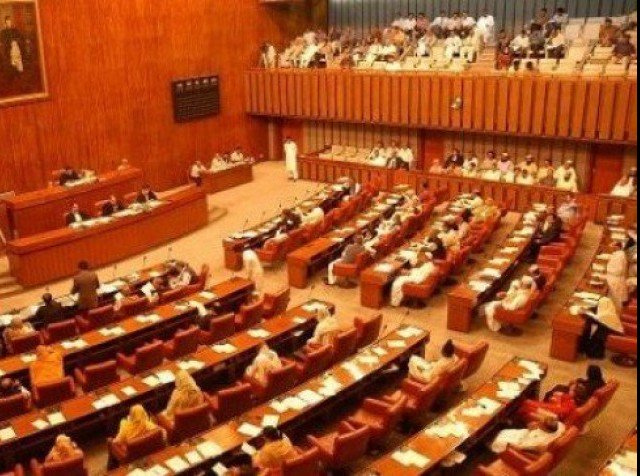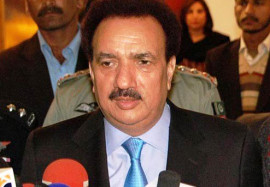
ISLAMABAD: State Bank of Pakistan (SBP) Governor Tariq Bajwa declared on Thursday that achieving modest economic growth and controlling inflation were his two key objectives, indicating a prolonged spell of low economic activities that will also increase unemployment.
Bajwa and Minister of State for Revenue Hammad Azhar gave a briefing on economic management and exchange rate policy to the Senate Standing Committee on Finance. Contrary to expectations, the committee chairman described the briefing as an indication that the government and the central bank were “helpless” in managing the economy.
The briefing took place on the day Moody’s credit rating agency projected 4.3% economic growth in Pakistan this year - a level that was almost half the pace Pakistan required to absorb the youth bulge looking for employment.
Senate committee rejects ministry’s report on ECL
In a charged atmosphere, government authorities and senators rudely rejected each other’s point of view. The SBP governor reluctantly accepted the committee’s decision on discussing currency depreciation in the presence of media.
Pakistan Peoples Party’s (PPP) Senator Sherry Rehman played a prominent role in keeping the discussions within public domain.
The SBP’s goal was to keep growth at a modest level and inflation under control, said the governor. His statement indicated that the government would not be able to achieve a higher growth rate, which was necessary to ensure employment.
There was consensus among economists that any growth rate that was lower than 7-8% would increase unemployment, which was officially estimated at 6%. However, independent assessments showed that the jobless rate had already touched double digits.
The governor added that after recent adjustments to the rupee-dollar parity, “we are reaching near equilibrium”. The minister of state for revenue reiterated that the rupee-dollar parity was now “close to equilibrium” after recent adjustments.
After the meeting, the central bank governor ducked a question on the current exchange rate of Rs139 to a dollar and the projections he had made for June 2019. Over two months ago during a presentation to the prime minister, Bajwa stated that the value of the rupee could be Rs137 against the dollar in June 2019 - a level that had already been breached.
Responding to questions of committee members, Bajwa said aggregate demand in the economy had increased and inflationary pressures had started building up.
He highlighted that the SBP had fixed the exchange rate in the past few years but now it made six adjustments in the last 11 months. Only in the current fiscal year, the central bank has let the currency depreciate by 13.7% or Rs14.4 to a dollar. Overvaluation of the currency impacted the industrial base of the country, which led to de-industrialisation, regretted Bajwa.
He emphasised that exchange rate adjustments had started yielding results as imports registered negative growth in first five months of the current fiscal year but the committee members disagreed. “Had we not made adjustments to the value of the rupee, the country’s current foreign currency reserves of mere $7.2 billion would have diminished,” remarked Bajwa.
He lamented that the central bank had no other option but to let the currency weaken due to growing gap between demand and supply in the currency market.
The governor was expressing his helplessness in managing the economy, suggested Standing Committee Chairman Farooq H Naek of the PPP. He agreed that Pakistan’s economy was under “great great pressure” and the government and the SBP did not have plans to manage it.
Responding to a question, Bajwa said the finance minister had himself acknowledged that the central bank informed him beforehand about the currency depreciation.
Senator Sherry Rehman alleged that before November 30 people had knowledge about the currency depreciation decision but subsequent corrections made by the central bank pointed towards insider trading.
On November 30, the value of the rupee slid to Rs146 to a dollar before recovering to Rs137 on the same day.
Senate panel rejects ministry's report on no-fly-list
The revenue minister denied that there was insider trading. “We had no reports about currency market manipulation,” said Azhar.
The present level of current account deficit was unsustainable, unless the SBP intervened and let the rupee weaken, said the central bank governor. Azhar added that the government targeted narrowing down the current account deficit to below $13 billion, a reduction of 31.5% over last year’s level. “Chinese imports are hurting Pakistan badly but the government is not doing enough,” said Naek.
The revenue minister stated that China started online data exchange which would assist in addressing under-invoicing of imported goods.
Published in The Express Tribune, December 14th, 2018.
Like Business on Facebook, follow @TribuneBiz on Twitter to stay informed and join in the conversation.






















































COMMENTS
Comments are moderated and generally will be posted if they are on-topic and not abusive.
For more information, please see our Comments FAQ